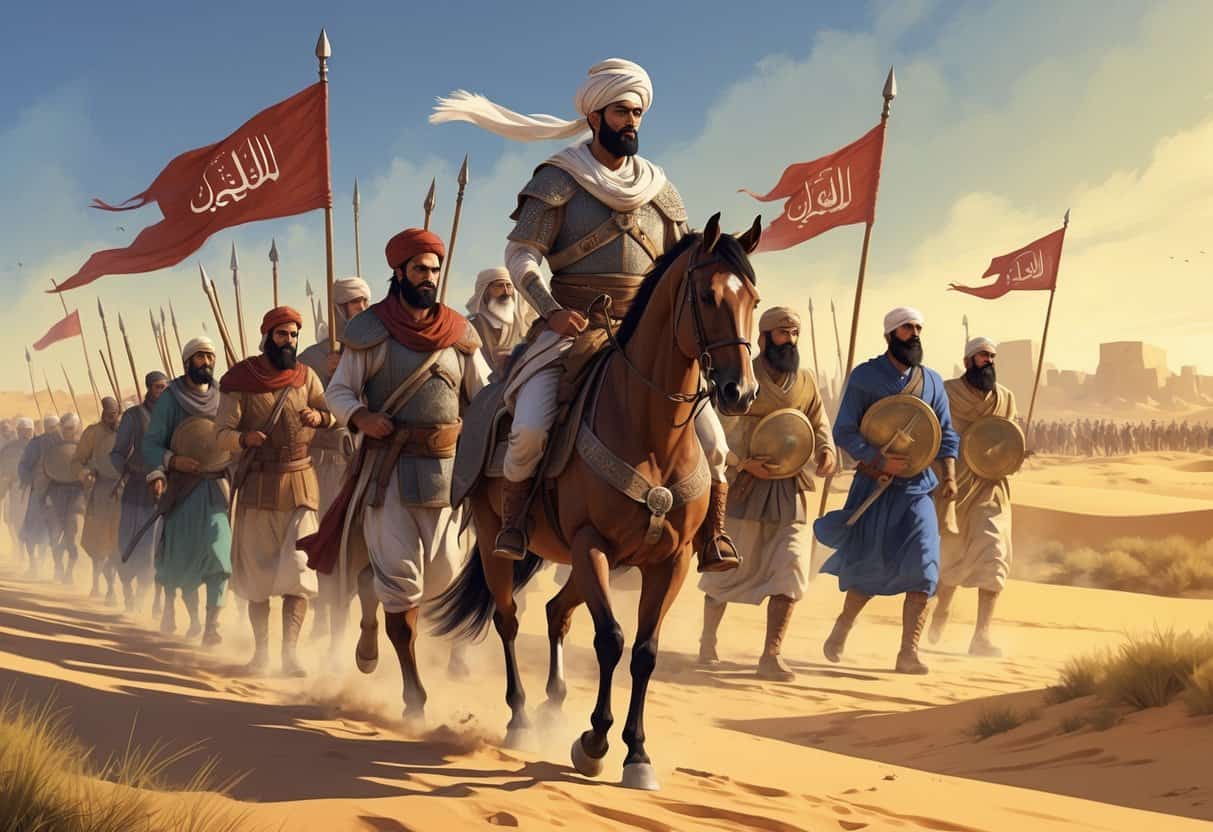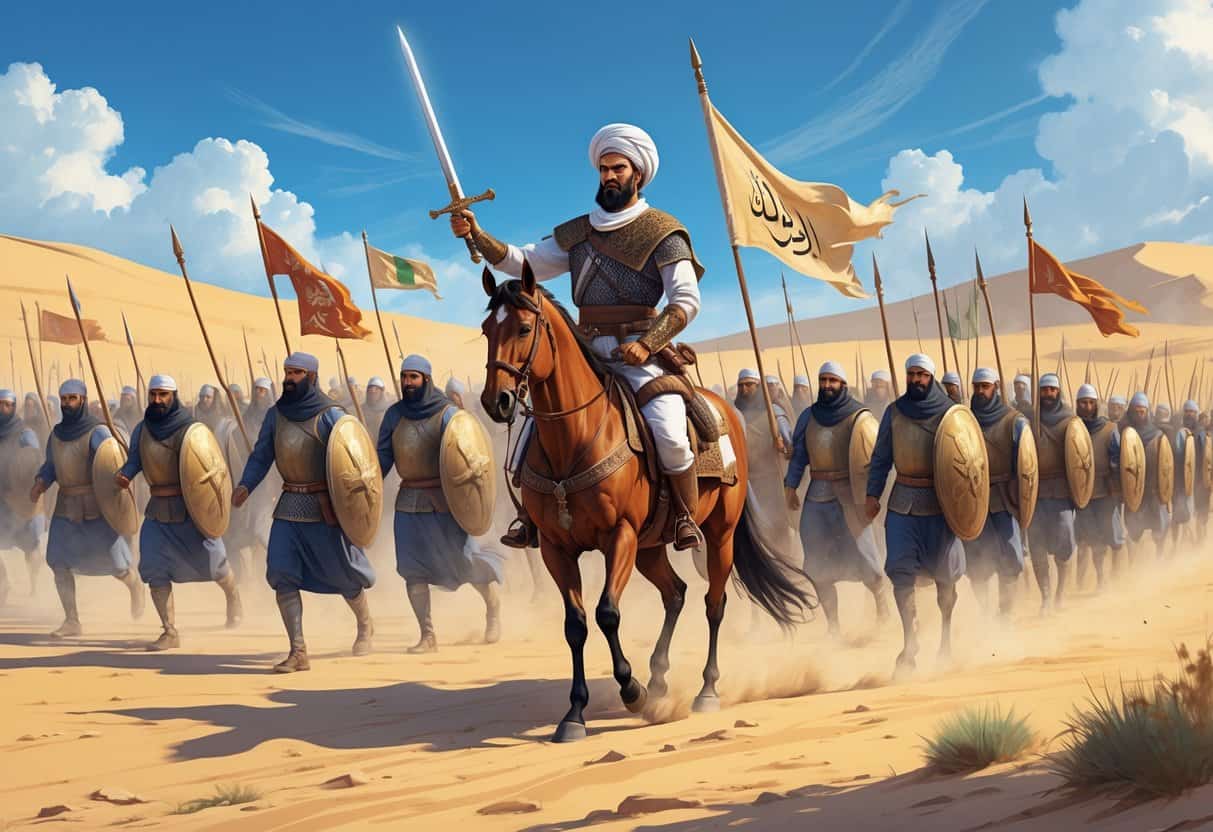Khalid ibn al-Walid was a key military leader behind the early Islamic conquests, helping to expand Muslim rule across large parts of the Middle East.
His skill in battle and leadership helped defeat powerful empires like Persia and Rome.

You’ll see how Khalid transformed the early Muslim forces into a highly effective army.
His victories at places like Yarmouk and Qadisiyyah were crucial in establishing Muslim control over new regions.
This guide breaks down his role and importance in a way that’s hopefully pretty clear and straightforward.
Key Takeaways
- Khalid played a major role in building the early Muslim military’s strength.
- He led important battles that expanded Muslim territory quickly.
- His conquests had lasting effects on the balance of power in the region.
Khalid ibn al-Walid and the Rise of the Muslim Army

Let’s get into Khalid ibn al-Walid’s background, his connection to Prophet Muhammad, and how his skills shaped the growing Muslim army.
His loyalty and leadership helped expand the early Islamic community and left a mark on military history.
Early Life and Conversion
Khalid ibn al-Walid came from a respected Quraysh family in Mecca.
Before supporting Islam, he actually fought against the Muslim community in several battles.
His conversion to Islam happened around 629 CE, after he recognized the strength and truth of Muhammad’s message.
Once he joined, he became a devout follower and defender of Islam.
This change was crucial because it added a skilled and knowledgeable commander to the Muslim ranks.
His knowledge of Meccan culture and military tactics helped the Muslim army grow stronger.
You could see his early life as a kind of bridge between old rivalries and the new Islamic movement.
Relationship with Prophet Muhammad
Khalid’s relationship with Prophet Muhammad became one of trust and respect after his conversion.
Muhammad valued Khalid’s bravery and insight in battle.
This partnership helped the Muslim community face external threats.
Muhammad gave Khalid important commands and relied on his judgment during critical moments.
This trust showed in key battles where Khalid led Muslim forces to victory.
Their bond also symbolized the unity in the Islamic community.
Khalid worked not just as a soldier but as a loyal supporter of Muhammad’s mission to spread Islam.
Strategic Military Leadership
Khalid ibn al-Walid became a lead general who changed how the Muslim army fought.
He used quick movements and surprise attacks to win battles against larger, better-equipped armies.
You can look at his strategies, like the use of mobile cavalry and smart troop placement, which helped secure major wins, including at the Battle of Yarmouk.
These victories secured Muslim control over important regions.
His ability to adapt his tactics to different enemies made the Muslim army more powerful.
Khalid’s leadership also raised morale among fighters—showing how key decisions can really shape military success.
His role was vital in turning a small community into a strong, expanding army.
Major Military Campaigns of the Islamic Conquests
Here’s a look at the key battles and military actions led by Khalid ibn al-Walid during the Islamic conquests.
These campaigns include early fights, the unification of the Arabian Peninsula, battles against the Byzantine Empire, and tactics involving archers and reinforcements.
Battle of Mu’tah and Early Engagements
The Battle of Mu’tah in 629 was one of the first major battles involving Muslim forces under Khalid ibn al-Walid, though at that time he wasn’t yet the main commander.
It was fought against the Byzantine and Ghassanid forces.
Khalid took command after the initial leaders were killed.
This battle showed Khalid’s ability to lead against a larger and more experienced army.
Though it ended in a strategic withdrawal, it earned him a reputation for skill and courage.
Early engagements like this prepared Khalid for the challenges ahead.
Conquest of the Arabian Peninsula
After Muhammad’s death, Khalid played a key role in uniting the Arabian Peninsula.
He led campaigns against tribes that refused to pay taxes or broke treaties.
His military actions were swift and decisive.
Khalid helped bring regions such as Najd and Yemen under Muslim control.
His use of fast-moving cavalry and surprise attacks crushed resistance quickly.
This unification stabilized the region and opened the door for further expansion.
Wars Against the Byzantine Empire
Khalid’s most famous victories came against the Byzantine Empire.
The Battle of Yarmouk in 636 was critical.
He led a Muslim army that decisively defeated a large, well-equipped Byzantine force.
This victory secured Syria and Palestine for the Muslims and reduced Byzantine power in the Levant.
Khalid’s leadership was vital in coordinating attacks and keeping morale up.
Other battles in the region continued to weaken Byzantine control, making way for Islamic rule.
Key Tactics and Use of Reinforcements
Khalid was known for clever use of tactics and reinforcements.
He used archers to weaken enemy lines before sending in cavalry charges.
He also moved forces quickly to strike when enemies were unprepared.
His ability to bring reinforcements at just the right moment often changed the course of battles.
For example, during the campaigns in Syria, he shifted troops between fronts to exploit weaknesses.
His strategies focused on flexibility and surprise, increasing the chances of victory while minimizing losses.
Impact and Legacy of Khalid ibn al-Walid’s Victories
Khalid ibn al-Walid’s impact shows up in the rapid growth of the Islamic Empire and its influence on culture, politics, and religion.
His military success shaped relations with various groups and set standards for how battles and losses were remembered.
Spread of Islam and the Islamic Empire
Khalid’s victories helped Islam spread quickly beyond Arabia.
He defeated the armies of the Persian and Roman Empires, allowing Islamic rule to expand into new lands like Iraq and Syria.
This expansion brought many new people under Islamic leadership.
Islam’s message reached diverse populations, and the empire’s borders grew sharply during and after his campaigns.
His military skill secured large territories.
These lands often saw the building of mosques and centers of Islamic learning.
This created a strong foundation for the Muslim community, or Ummah, to grow politically and religiously.
Influence on Baghdad and Islamic Civilization
Though Baghdad was founded after Khalid’s time, his conquests set the stage for it to become an important Islamic center.
The lands he won became part of the empire where Baghdad would later rise as a capital.
The unification of these areas under Muslim rule helped spread Islamic culture, science, and philosophy.
Baghdad’s future role as a hub in Islamic civilization depended on these earlier conquests.
Relations with Arab Christians and Non-Muslims
Khalid’s campaigns often brought him into contact with Arab Christians and other non-Muslim groups.
He continued existing policies that allowed religious communities to live under Islamic rule with some protections.
While battles were fought, many agreements were made ensuring that Christians and others could practice their faith.
This approach balanced military victory with social order and helped maintain stability in newly conquered lands.
It’s worth noting that terms like “infidels” or “unbelievers” reflect historical perspectives used at the time.
Khalid’s leadership didn’t always mean harsh treatment but often focused on governance and alliances.
Martyrdom, Casualties, and Remembering the Fallen
Plenty of soldiers lost their lives during Khalid’s campaigns. The concept of martyrdom really took root—these fighters were honored for their sacrifice in what many viewed as a holy war.
Casualties hit both Muslim and opposing armies hard. Khalid’s leadership aimed for victory but also tried to avoid needless deaths, though, of course, war is never clean.
Muslims kept the memory of those who died alive to inspire future generations. These fallen were celebrated as heroes, and that legacy helped boost morale and hold the community together.